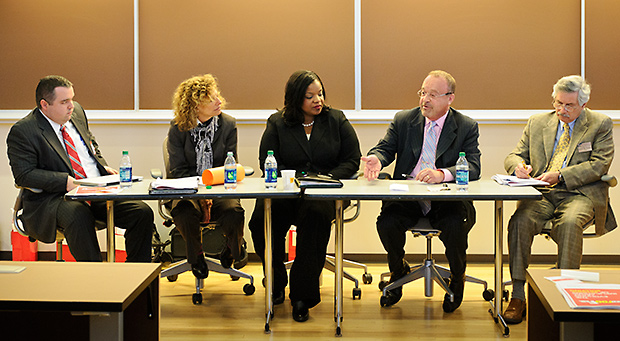Symposium brings issues to ‘bully’ pulpit

Panelists Joshua Sheffer, Diane Rosenfeld, Angela Reddock, Mitch Crane and Northeastern law professor David Phillips, who acted as moderator, discussed hazing at a panel Friday. Photo by David Leifer.
When it comes to examining bullying among school-age children, David E. Sullivan, the district attorney for Massachusetts’ Northwestern District, said it’s impossible to focus just on what happens in the classroom and on the playground.
“We have to look at cyber-bullying, and we have to look at what happens on the school bus. The real threshold is if it is affecting a child’s ability to get an education,” said Sullivan, a keynote speaker at a symposium hosted by the Northeastern University Law Journal on Friday. Sullivan’s office investigated and prosecuted the case involving Phoebe Prince, the teenager who took her own life in 2010 after months of bullying from classmates. The case drew global attention.
The daylong symposium — entitled “Pushed Too Far: The Evolving Legal Implications of School Bullying” — is the same topic that will be covered in all articles in this year’s edition of the law journal.
“We’re very different from the more traditional legal journals, which take articles on any topic,” said law student David Swanson, who with fellow student Jonathan Cohen edited the symposium. “Every year we choose a single topic for our issue, and we aim for it to be something important in the public eye.”
The event, held in Dockser Hall, drew a mix of law students, lawyers, professors and school administrators and focused on issues including antibullying legislation, criminal prosecution of bullies and cyberbullying and the First Amendment.
Attendees also addressed the topic of hazing on college campuses.
“These aren’t crimes where people set out to hurt somebody,” said Mitch Crane, a lawyer and former judge who gives seminars on hazing, date rape and sexual assault. “In fact, the opposite is usually true — these are cases where people want to trust and belong to a group and something goes terribly wrong.”
Though many national student organizations have strict policies against hazing, individual chapters often overlook or blatantly ignore those rules, said Angela Reddock, a Los Angeles lawyer who has successfully litigated several prominent hazing lawsuits.
“At the crux of all of this is the intersection of policies and practices,” Reddock said. “Even with these policies, there is often an underground process you have to go through so you aren’t called a ‘paper member’ [of an organization on a college campus] but are a real member.”
Diane Rosenfeld, who teaches courses on gender violence at Harvard Law School, said individuals must step up and resist complacency in order to prevent bullying, hazing and other harassment.
“Each of us has a very important role in intervening,” Rosenfeld said. “This culture is not possible unless you have people thinking they cannot do anything to stop it, and you have the power to make real change.”





